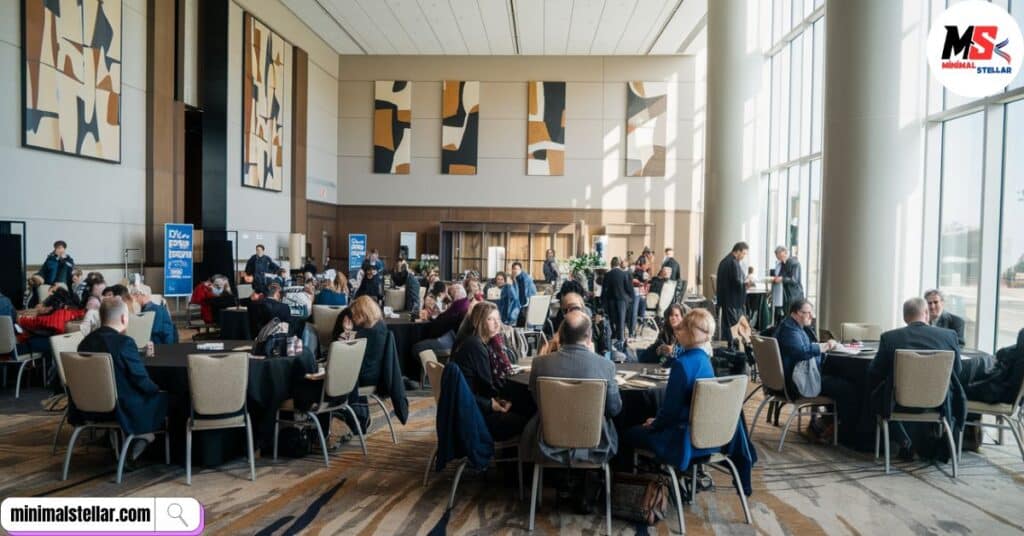Events are a cornerstone of the hospitality industry, driving innovation, economic growth, and customer engagement. From music festivals and sports tournaments to luxury expos and business conferences, events generate billions in revenue and create opportunities for destinations and businesses to thrive. These gatherings bring together diverse audiences, showcasing destinations and fostering memorable experiences that define modern hospitality.
As consumer preferences evolve, so does the role of events. Whether it’s through virtual platforms, sustainable practices, or innovative event planning strategies, the industry continuously adapts to meet shifting demands. Understanding the nuances of the events sector is key to appreciating its significance. By delving into topics like guest experience optimization, MICE events, and the rise of technology, we’ll explore how events shape the hospitality landscape. And, what is dystopian fashion when compared to this creativity-driven industry? The question underscores the stark contrast between futuristic, dark themes and the vibrant innovation events bring to hospitality.
A Booming Industry
Events have transformed the hospitality industry into a dynamic, ever-expanding field. Across the globe, meetings, incentives, conferences, and exhibitions (MICE) generate immense revenue and attract millions of travelers. In the U.S., events contribute close to $1 trillion annually, showcasing their importance as economic drivers. Similarly, Europe’s steady growth in event hosting and Asia’s booming market reflect the global appeal of this sector.
This growth isn’t confined to traditional formats. The rise of hybrid and virtual events, spurred by technological advancements, has expanded opportunities for global participation. Hotels, resorts, and even unconventional venues like co-working spaces now host diverse gatherings. Events not only fill accommodations but also bring customers to restaurants, entertainment hubs, and local attractions, amplifying their impact on the broader economy.
The Importance of Events

At their core, events are more than just gatherings—they’re powerful tools for building connections and enhancing brand value. For destinations, hosting high-profile events boosts tourism and strengthens their global reputation. For businesses, events provide platforms to showcase products, build partnerships, and engage with target audiences.
Consider how sports organizations like UEFA and the International Olympic Committee leverage events. By integrating VIP hospitality services and personalized experiences, they enhance customer satisfaction and profitability. Meanwhile, cultural festivals and trade shows highlight local traditions, attracting international visitors and contributing to sustainable tourism. Events foster a sense of community and pride while generating opportunities for growth.
Gain the Skills Needed
The rapid expansion of the events sector has heightened demand for skilled professionals who can innovate and execute flawlessly. Event management requires a blend of creativity, organization, and business acumen. Professionals must understand market trends, anticipate client needs, and deliver experiences that leave lasting impressions.
Educational institutions, such as Glion Institute of Higher Education, offer specialized programs in event management, equipping students with tools to succeed in this competitive field. By learning to navigate challenges like cultural nuances, budgeting, and digital marketing, aspiring event planners gain the confidence and expertise needed to thrive. With alumni excelling in diverse roles, the value of proper training is evident.
Event Management Trends

The events industry constantly evolves, embracing trends that redefine traditional approaches. One prominent trend is the integration of technology, from augmented reality experiences to AI-driven personalization. Virtual and hybrid events, accelerated by global challenges like the COVID-19 pandemic, have opened doors to wider participation.
Sustainability is another key trend. Green initiatives, like minimizing waste and sourcing local products, resonate with eco-conscious consumers. Similarly, the focus on inclusivity ensures events cater to diverse audiences, creating meaningful and impactful experiences. These trends highlight how innovation and adaptability keep the industry thriving.
Hospitality Industry Conferences
Conferences are vital to the hospitality industry, offering platforms for knowledge-sharing and networking. These gatherings attract professionals from around the world, fostering collaboration and driving industry advancements. Destinations hosting such events benefit from increased exposure and economic activity.
Hotels and resorts, in turn, adapt their services to meet the needs of conference attendees. By providing seamless logistics, state-of-the-art facilities, and exceptional hospitality, they ensure a positive experience that encourages return visits. Conferences exemplify how events and hospitality work hand in hand to create value.
Corporate Event Planning
Corporate events, from product launches to team-building retreats, play a crucial role in strengthening businesses and enhancing their visibility. These gatherings allow companies to connect with stakeholders, showcase their offerings, and reinforce their brand identity.
Planning successful corporate events requires meticulous attention to detail. Venues must align with the company’s image, while catering, décor, and activities should reflect their values. Hospitality professionals excel at creating personalized experiences that align with business objectives, proving their indispensable role in this niche.
Guest Experience Optimization
Optimizing guest experiences is central to the success of any event. Exceptional service, innovative amenities, and attention to detail transform gatherings into unforgettable memories. Whether it’s a VIP hospitality lounge at a music festival or personalized touches at a wedding, these elements elevate the overall experience.
Hospitality professionals achieve this by understanding their audience. By anticipating needs and exceeding expectations, they foster loyalty and satisfaction. Advanced tools like customer feedback systems and data analytics further enhance their ability to refine services.
12 French Crop Hairstyles – The Ultimate Guide [2024]
Tourism Industry Workshops
Workshops focused on tourism and hospitality bring together experts to share insights and foster innovation. These events often address critical topics like sustainable practices, cultural tourism, and technological advancements, empowering attendees to drive change in their fields.
Such workshops not only benefit participants but also boost the hosting destination’s reputation as a hub for industry excellence. Local businesses, from hotels to transportation providers, gain exposure and revenue, underscoring the symbiotic relationship between workshops and hospitality.
Sustainable Event Practices
Sustainability has become a cornerstone of modern event planning. Organizers are increasingly adopting practices that minimize environmental impact while maximizing social benefits. From using renewable energy sources to promoting local vendors, these efforts align with global sustainability goals.
Guests appreciate eco-friendly initiatives, making them a selling point for events. For the hospitality industry, integrating sustainable practices enhances brand reputation and attracts conscientious consumers. This shift reflects a broader commitment to responsible tourism and long-term success.
13 Mullet Fade Haircuts For Men – The Ultimate Guide [2024 Edition]
Luxury Hospitality Expos
Luxury expos showcase the finest offerings in hospitality, from opulent accommodations to gourmet dining. These events cater to high-net-worth individuals and industry professionals, providing a platform for brands to shine.
For hospitality businesses, participating in such expos is an opportunity to highlight their unique value propositions. By creating immersive displays and engaging with attendees, they strengthen their position in the competitive luxury market.
Conclusion
Events are the lifeblood of the hospitality industry, driving economic growth, fostering innovation, and creating unforgettable guest experiences. From corporate gatherings to cultural festivals, they bring people together and showcase the best of what destinations have to offer. As trends like sustainability and technology continue to shape the sector, the potential for growth remains limitless.
Understanding the importance of events and embracing their transformative power is crucial for hospitality professionals. By staying ahead of trends, investing in skills development, and prioritizing customer satisfaction, the industry can continue to thrive in an ever-changing landscape.
Frequently Asked Questions (FAQs)
What is the role of events in the hospitality industry?
Events drive revenue, attract tourists, and enhance guest experiences. They foster connections, showcase destinations, and create opportunities for innovation.
What is dystopian fashion in the context of hospitality events?
While dystopian fashion represents dark, futuristic themes, it contrasts with the creativity and vibrancy of hospitality events, which focus on connection and engagement.
Why are MICE events important?
MICE events (Meetings, Incentives, Conferences, and Exhibitions) generate significant revenue, attract international audiences, and drive business growth.
How does sustainability impact event planning?
Sustainable practices minimize environmental impact and appeal to eco-conscious consumers, enhancing the overall value and reputation of events.
What skills are needed for event management?
Key skills include creativity, organization, communication, budgeting, and an understanding of trends like technology and sustainability in event planning.

Eliana Amelia is the insightful author behind Minimal Stellar. With extensive experience in blogging, she expertly crafts content on the latest hair trends and cutting techniques. Eliana’s passion for haircare and style, combined with her professional expertise, ensures that her readers receive valuable, up-to-date advice. Her dedication to helping others look and feel their best shines through in every post.







